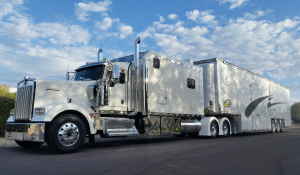Introduction To Car Shipping During Covid-19
The outbreak of the COVID-19 pandemic has brought unprecedented challenges to numerous industries worldwide, with the car shipping sector being no exception. The transportation of vehicles, which involves intricate logistics, close human contact, and interaction with various surfaces and environments, has required a thorough reevaluation of safety measures to protect both customers and employees. As the world navigates through the uncertainties of the pandemic, it has become essential for car shipping companies to adopt stringent safety protocols to minimize the risk of virus transmission without compromising the efficiency and reliability of their services.
Car shipping during the COVID-19 pandemic necessitates an enhanced focus on sanitization, social distancing, and use of personal protective equipment (PPE). Companies have been tasked with implementing these precautions to ensure that vehicles are transported safely and that all parties involved are protected. The initial point of contact, often at the customer’s home or a designated pickup location, must be managed with utmost care.
Drivers and vehicle handlers are required to wear masks, gloves, and frequently sanitize their hands to prevent any potential transmission. Vehicles are disinfected before and after transport, including high-touch areas like steering wheels, door handles, and seats, to further reduce the risk of contamination.
Additionally, car shipping companies have had to adapt to changes in customer interaction methods. To minimize direct contact, many companies have moved to online and contactless services. Digital documentation, electronic signatures, and virtual inspections are some of the innovations that have become more prevalent. These measures not only help in maintaining social distancing but also streamline the administrative aspects of the shipping process.
Furthermore, companies are taking extra steps to ensure the safety of their workforce. This includes regular health screenings, maintaining social distancing protocols in dispatch centers and offices, and providing support for employees who may need to quarantine following potential exposure. By integrating these comprehensive safety measures, car shipping companies can continue to offer their vital services while safeguarding public health during the ongoing pandemic.
Understanding The Impact Of Covid-19 On The Car Shipping Industry
The advent of the COVID-19 pandemic had sweeping effects on industries globally, and the car shipping industry was no exception. Almost overnight, a business that relied heavily on logistics, coordination, and face-to-face interactions had to adapt to unprecedented challenges. The car shipping industry experienced disruptions in various facets, from operational practices to supply chain logistics, compounding the already complex nature of automotive transport.
The impact began with the immediate suspension of services due to lockdown mandates and travel restrictions imposed by governments worldwide. These measures were necessary to curb the spread of the virus but inadvertently caused significant delays in car shipping schedules. Ports, a critical node in the logistics chain, saw reduced activity as workforce numbers dwindled due to health concerns and quarantine requirements.
This led to a backlog of vehicles waiting to be shipped or received, exacerbating the strain on the industry.
Moreover, the industry faced a dramatic shift in consumer behavior. With people avoiding public transportation and opting for personal vehicles to minimize exposure, the demand for cars surged. Consequently, the need for car shipping services increased, putting pressure on an already strained system. This demand-supply imbalance highlighted vulnerabilities in the logistics network and called for swift adaptation.
Shipping companies had to implement rigorous health and safety protocols to protect their staff and customers. These included frequent sanitation of vehicles, mandatory use of personal protective equipment (PPE) for workers, and contactless delivery wherever possible. Communication transparency became vital, with companies maintaining constant updates to customers regarding potential delays and safety measures in place.
Additionally, international car shipping was profoundly affected by the variation in COVID-19 regulations across different countries. Navigating these disparate regulatory landscapes required agility and precise coordination to ensure compliance and minimize disruptions. Shipping routes had to be reevaluated regularly to adapt to evolving restrictions, leading to increased operational costs.
The pandemic underscored the importance of flexibility and robust contingency planning in the car shipping industry. Companies that swiftly adapted to the new normal, embracing digital solutions and stringent safety protocols, positioned themselves to mitigate the impact of COVID-19 effectively. As the world gradually recovers, the lessons learned during this period are likely to inform future practices and enhance the resilience of the car shipping sector.
Enhanced Safety Measures For Car Shipping Services
During the COVID-19 pandemic, car shipping services have had to implement several enhanced safety measures and precautions to ensure the health and safety of both their customers and employees. One significant step taken by these companies is the adherence to stringent sanitation protocols. This involves the regular and thorough cleaning of transport trucks, containers, and especially those areas frequently touched like door handles, steering wheels, and seats.
Sanitizing the vehicles both before and after transport has become a crucial practice to reduce the risk of viral transmission.
Additionally, the companies have made considerable changes to their employee protocols. Staff members, including drivers and those involved in vehicle inspection and handling, are required to wear personal protective equipment (PPE) such as masks and gloves at all times while on the job. Regular health checks, including temperature screenings and symptom monitoring, have been instituted to quickly identify any signs of illness.
Employees displaying any symptoms of COVID-19 are urged to stay home and seek medical attention.
The interaction between customers and company personnel has also been minimized to limit potential exposure. Many car shipping services have moved to contactless procedures wherever possible. This includes virtual inspections, electronic documentation, and digital signatures. When physical interaction is unavoidable, such as during vehicle pickup or delivery, social distancing guidelines are strictly followed, maintaining a safe distance of at least six feet between individuals.
Communication has been adapted to ensure clarity and efficiency under the new safety conditions. Companies continuously update their customers about any changes in service or protocols. They also provide clear instructions for customers to prepare their vehicles, ensuring that these guidelines are understood and followed to maintain safety.
Providing employees with comprehensive training on the new safety measures helps in consistent implementation and enhances overall compliance. The changes in logistics and operations due to the pandemic have called for increased flexibility, and companies are making adjustments as needed to align with evolving public health advice.
Sanitization Protocols For Vehicles And Equipment
During the COVID-19 pandemic, stringent sanitization protocols for vehicles and equipment became a critical aspect of the car shipping industry. These measures aimed to ensure the safety and well-being of both employees and customers. Implementing such protocols involved a multifaceted approach, beginning with the thorough cleaning and disinfecting of all vehicles before and after transport. Special attention was given to high-touch surfaces such as door handles, steering wheels, gear shifts, and control panels.
Disinfectants compliant with guidelines from health authorities, such as the CDC and WHO, were utilized to eliminate the potential presence of the virus.
The sanitization process often started with an initial dry cleaning session to remove any visible dirt or debris. This was followed by a comprehensive wet cleaning using water and soap to break down any protective layers of potential contaminants. The final stage involved the application of EPA-approved disinfectants designed to effectively neutralize the virus. High-temperature steam cleaning methods were sometimes employed for interior surfaces, providing an added layer of sterilization without causing damage to sensitive areas.
In addition to vehicle sanitization, the equipment used in the car shipping process also underwent rigorous cleaning protocols. This included tools and machinery such as winches, lifts, and dollies. Handheld devices like scanning tools and mobile phones used by personnel received frequent disinfecting, especially after coming into contact with multiple individuals or surfaces. Employees were trained in proper sanitization techniques to ensure consistent application of cleaning protocols, with periodic audits conducted to maintain high standards.
Sanitization procedures were meticulously documented for accountability and transparency, providing customers with peace of mind. Fact sheets detailing the sanitization steps taken were often provided to customers, reinforcing trust and demonstrating the company’s commitment to safety. Personal protective equipment (PPE) such as gloves, masks, and face shields became standard gear for all employees, further minimizing the risk of transmission during the car shipping process.
Communication between staff and customers was shifted to digital platforms to reduce physical interactions, and contactless delivery options were introduced where feasible. Through these comprehensive sanitization protocols, the car shipping industry adapted to the unique challenges posed by the pandemic, ensuring the safe and efficient transport of vehicles amid a global health crisis.
Health And Safety Guidelines For Shipping Personnel
Ensuring the health and safety of shipping personnel during the ongoing COVID-19 pandemic requires implementing strict measures and precautions. First and foremost, shipping companies must provide comprehensive training to personnel on COVID-19 safety protocols. This includes understanding the symptoms of the virus, practicing good hygiene, and knowing the appropriate actions to take if exposure is suspected. Frequent handwashing with soap and water for at least 20 seconds is crucial, and in situations where this is not possible, hand sanitizers with at least 60% alcohol should be used.
Personal Protective Equipment (PPE) is an essential part of the safety guidelines. All shipping personnel should wear masks at all times, especially when interacting with others or handling cargo. Gloves should be worn when handling packages to minimize direct contact, and face shields can add an extra layer of protection during closer interactions. It is important for the PPE to be used correctly and disposed of properly to prevent contamination.
Social distancing measures must be rigorously followed. Shipping personnel should maintain a minimum distance of six feet from others whenever possible. In the context of loading and unloading vehicles, contactless procedures should be implemented. Instead of signing documents in person, electronic signatures or other touch-free validation methods should be adopted. When physical presence is unavoidable, it should be scheduled to avoid crowding and ensure that only essential personnel are on site.
Regular health screenings can help in early detection of symptoms. Daily temperature checks should be mandatory for all shipping personnel before beginning their shifts. Anyone showing symptoms of COVID-19 or having been in contact with a confirmed case should self-isolate immediately and inform their supervisors.
Sanitization of surfaces and equipment is another critical aspect of maintaining safety. Vehicles, especially commonly touched surfaces within the cabin and cargo area, should be thoroughly cleaned and disinfected between shipments. This helps to ensure that the risk of virus transmission through surfaces is minimized. Furthermore, ensuring that shipping personnel have access to updated information from health authorities and receiving regular briefings on any new or emerging risks related to COVID-19 will also serve to keep everyone informed and vigilant.
By adhering to these guidelines, the health and safety of shipping personnel can be significantly safeguarded during these challenging times.
Contactless Car Shipping Options
As the world navigated the unprecedented challenges brought on by the COVID-19 pandemic, the car shipping industry had to adapt to ensure the safety of both customers and employees. One of the most significant changes was the introduction of contactless car shipping options. These services have transformed a traditionally hands-on process into a seamless and safe experience, minimizing the risk of virus transmission.
Contactless car shipping begins with the scheduling process. Traditionally, this would involve in-person interactions at branch offices or physical paperwork exchanges. However, the industry quickly pivoted to leverage digital tools. Customers can now book their car shipments entirely online. This includes filling out forms, signing contracts, and making payments, all of which can be done from the comfort of their homes using secure, encrypted platforms.
Online tracking tools have also been enhanced, allowing customers to monitor the status and location of their vehicle in real-time, reducing the need for frequent, direct communication.
Vehicle handovers have also been reimagined to ensure minimal contact. When picking up a vehicle, drivers now use no-touch methods to collect keys and documents. Many companies have implemented the use of lockboxes and key drop-off points, which allow customers to leave their keys securely without a face-to-face interaction. Drivers are also equipped with personal protective equipment (PPE), such as masks and gloves, and follow strict hygiene protocols, including regular sanitization of their hands and any surfaces they touch.
At the delivery end, the contactless approach continues. Customers receive notifications about the estimated arrival time, ensuring they can prepare for a no-contact handover. The keys are left in a pre-agreed location, and digital photographs or videos are used to document the condition of the vehicle upon delivery. This provides transparency without the need for physical presence or interaction.
To further ensure safety, regular health checks of drivers are conducted, and any personnel showing symptoms of illness are required to self-isolate. These measures, combined with the use of technology and strict hygiene practices, have made contactless car shipping not only feasible but also a preferred option during the pandemic. This approach effectively safeguards the health and well-being of everyone involved in the car shipping process.
Customer Guidelines For Safe Car Shipping During The Pandemic
During the COVID-19 pandemic, ensuring the safety and well-being of both customers and staff has become a top priority in the car shipping industry. Customers looking to ship their vehicles during these uncertain times should follow comprehensive safety measures and precautions to minimize health risks and ensure a smooth process. First and foremost, it is essential to select a reputable car shipping company that adheres to stringent COVID-19 safety protocols.
Verify that the company has implemented proper sanitation procedures, including the regular disinfection of carriers and equipment. Confirm that their staff members are trained in maintaining hygiene standards and are following recommended health guidelines.
Communication should be prioritized throughout the shipping process to reduce face-to-face interactions. Many companies have adjusted their procedures to allow for more digital and contactless transactions. Utilize online booking systems, electronic signatures, and digital payments whenever possible. Make sure to discuss all details with your chosen provider via phone or email, and request any necessary documentation to be sent electronically.
On the day of vehicle pickup, prepare your car by thoroughly cleaning both the interior and exterior. Remove all personal belongings and sanitize frequently touched surfaces, such as the steering wheel, gear shift, and door handles. Wear a mask and practice social distancing if you need to interact with the carrier’s personnel. To further minimize contact, ask the transporter to wear masks and gloves during the vehicle handover.
Keep up-to-date with current health guidelines and travel advisories related to COVID-19, as these can affect shipping timelines and procedures. Be patient and flexible, acknowledging that delays may occur due to the evolving nature of the pandemic.
Finally, stay informed by regularly checking updates from health authorities such as the Centers for Disease Control and Prevention (CDC) and the World Health Organization (WHO). By adhering to these customer guidelines and safety measures, you can help ensure that your car shipping experience during the COVID-19 pandemic remains safe and efficient for all parties involved.













